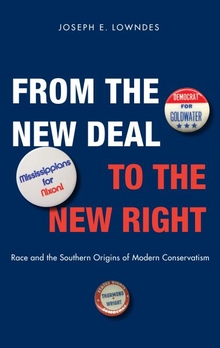From the New Deal to the New Right
WARNING
You are viewing an older version of the Yalebooks website. Please visit out new website with more updated information and a better user experience: https://www.yalebooks.com
Race and the Southern Origins of Modern Conservatism
Joseph E. Lowndes
A compelling account of the rise of the modern right in America
The role the South has played in contemporary conservatism is perhaps the most consequential political phenomenon of the second half of the twentieth century. The region’s transition from Democratic stronghold to Republican base has frequently been viewed as a recent occurrence, one that largely stems from a 1960s-era backlash against left-leaning social movements. But as Joseph Lowndes argues in this book, this rightward shift was not necessarily a natural response by alienated whites, but rather the result of the long-term development of an alliance between Southern segregationists and Northern conservatives, two groups who initially shared little beyond opposition to specific New Deal imperatives.
Lowndes focuses his narrative on the formative period between the end of the Second World War and the Nixon years. By looking at the 1948 Dixiecrat Revolt, the presidential campaigns of George Wallace, and popular representations of the region, he shows the many ways in which the South changed during these decades. Lowndes traces how a new alliance began to emerge by further examining the pages of the National Review and Republican party-building efforts in the South during the campaigns of Eisenhower, Goldwater, and Nixon. The unique characteristics of American conservatism were forged in the crucible of race relations in the South, he argues, and his analysis of party-building efforts, national institutions, and the innovations of particular political actors provides a keen look into the ideology of modern conservatism and the Republican Party.
Joseph E. Lowndes is assistant professor of political science, University of Oregon. He lives in Eugene.
"This book brilliantly describes the ideology of American conservatism. A richly detailed analysis that helps illuminate the development, rise, and the discursive peculiarities of this political movement."—Anne Norton, author of Leo Strauss and the Politics of American Empire
"This is an original, well-written, and important analysis of how the implosion of Southern segregation resulted in new party alignments, racial cleavage, and ideological divisions in American politics. Drawing on new primary sources and developing important theoretical arguments, Lowndes has made a major contribution to American political development."—Desmond King, University of Oxford and author of The Liberty of Strangers: Making the American Nation
"Evocative and analytical, this historical portrait shows how racial change in the South opened the door to conservative mobilization. Its powerful account of how a cross-regional alliance of white supremacists and business-oriented anti-New Dealers fundamentally reoriented American politics advances our understanding not just of pathways to the present, but of prospects for the future."—Ira Katznelson, author of When Affirmative Action Was White
"In reconstructing the intellectual, ideological, cultural, and institutional histories of the New Right's genesis and development, From the New Deal to the New Right challenges many conventional views about the movement's origins and content. This is an important contribution to our understanding of the southern, and racialist, roots of modern conservatism and with its rich, interdisciplinary focus, provides a very useful model of what the systematic study of politics can be."—Adolph Reed Jr., University of Pennsylvania
Publication Date: June 30, 2009








